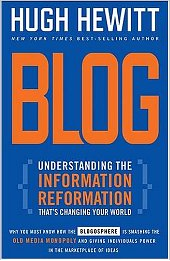I am a huge fan of Michael Egnor., a neurosurgeon and relatively recent convert to Catholicism who writes on intelligent design and the mind/brain problem. I loved it when he started writing on the Discovery Institute‘s Evolution News and Views blog. Now he has started a blog of his own called Egnorance and he writes with a flamethrower. His latest post titled Who’s more hateful: the God-full or the godless? is a work of art and takes down this ridiculous article with ease. I urge you to bookmark his blog and visit it whenever you are feeling a little down about getting beat up for thoughtfully held Christian positions. Egnorance does not suffer fools. I am glad he is mostly on my side.
Day: September 28, 2011
Day 37 of 1000
 I finished reading Hugh Hewitt‘s book, Blog Understanding the Information Reformation That’s Changing Your World. I liked the book a lot because it described some interesting events I watched closely at the time they were happening. I recommend it highly for those who want a description of the role of blogs during Rathergate, the Trent Lott take down, the Swiftboat Vets take down of John Kerry, and other similar events. It also describes the meltdown of the Main Stream Media (MSM) admirably. I hoped the book would describe some of the how-to’s with respect to blog traffic generation and how to run a blog, but that was not the focus of the book.
I finished reading Hugh Hewitt‘s book, Blog Understanding the Information Reformation That’s Changing Your World. I liked the book a lot because it described some interesting events I watched closely at the time they were happening. I recommend it highly for those who want a description of the role of blogs during Rathergate, the Trent Lott take down, the Swiftboat Vets take down of John Kerry, and other similar events. It also describes the meltdown of the Main Stream Media (MSM) admirably. I hoped the book would describe some of the how-to’s with respect to blog traffic generation and how to run a blog, but that was not the focus of the book.
The book is a fast, light read about how there is a sea-change taking place in the way news is reported, consumed, and corrected. It uses the advent of the printing press and its use during the Protestant Reformation in the conflict with the excesses of the Catholic Church as a very effective an analogy with what is happening with the Internet and blogs (the printing press), the Reformers (the bloggers), the Catholic Church (the MSM), and the powerless laity who no longer had to depend on the priesthood to get any understanding of the bible.
Hewitt made a point about the nature of the blogosphere that seems very obvious, but only after you hear it. He said the blogosphere is made up of a very small percentage of bloggers who are very big and get lots of hits and a large percentage of bloggers that, in real numbers, is huge who get a relative few number of visits per day, often consisting of friends and family. The large group of bloggers who have a relatively small number of visitors per day is called the tail. The predominant theme of the tail, if you can figure out what it is, is more important that the prominent theme of the big bloggers that get massive hits and visitors. He describes some of the ways he does that.
I am going to read another book on blogging next. I hope to find one that talks a little more about the how-to’s. After seven years of blogging with about 250 posts per year, I guess I could now call myself a committed blogger. Up until now, though, my writing has had the singular purpose of documenting our homeschool. Now I want to turn it into something else. I am in the process of defining what that is. It is definitely going to take some study and reflection.
